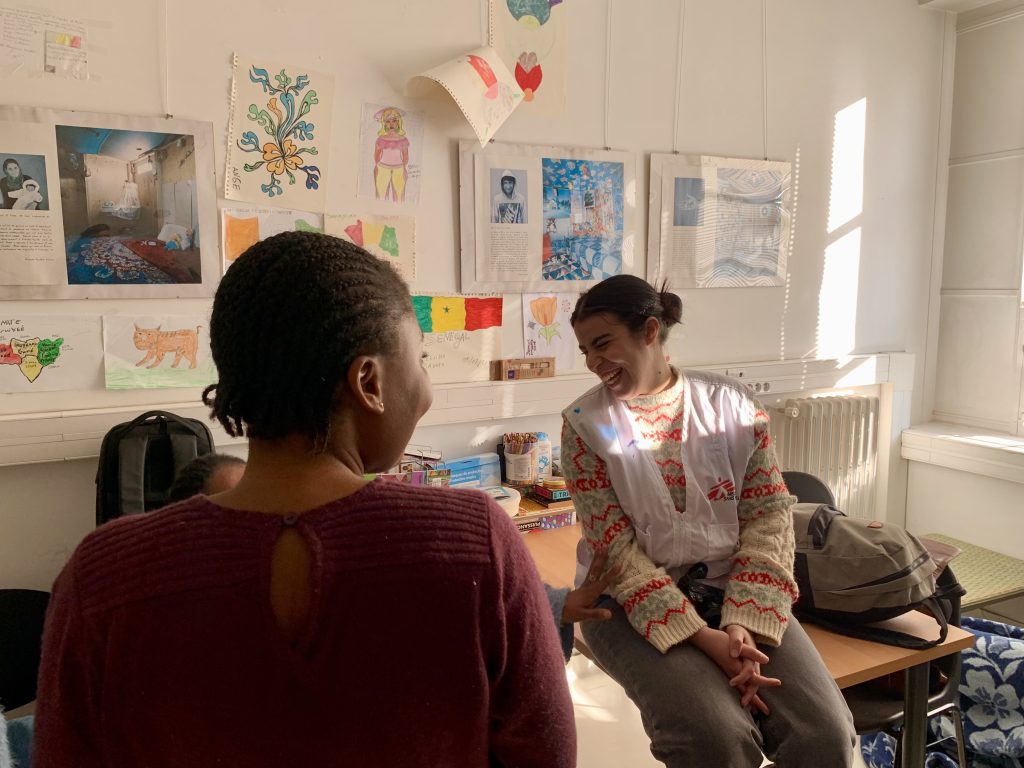Paris, France– Since July 2024, Médecins Sans Frontières (MSF) has reoriented its day centre for unaccompanied minors in Pantin, northeastern Paris, towards a programme exclusively dedicated to young girls. These teenage girls, who have filed appeals for recognition as minors, have been left without institutional protection despite their young age and extreme vulnerability.
“This change follows the observation of an increase in the number of arrivals of unaccompanied minor girls in Ile-de-France, and the recognition that there was no place specifically dedicated to them”, explains Ali Besnaci, MSF project coordinator in Ile-de-France. “We took the time to support the unaccompanied, underage boys we were looking after before devoting ourselves exclusively to young girls. They all left the MSF programme with a place address and access to the state medical assistance. Other associations and structures have taken over to welcome them.”
Dona is a young unaccompanied minor “on appeal”: after an initial assessment carried out by the department contested her under-age status, she has applied to the children’s court judge to be recognised as a minor. However, she has no institutional protection while awaiting her hearing. More than 120 young girls like Dona have been cared for by MSF teams since the changeover to a girls-only day centre began in July 2024.
The protection stakes are high: 60 per cent of the girls welcomed at the MSF centre in Pantin were living rough at the time of their inclusion. This is the case of Dona, who, when recalling the four nights she had to spend on the streets after first arriving in France, holds her breath and then breaks down in tears.
The fact that the centre is now exclusively for girls gives them a sense of security. More of them are coming to the MSF centre because they feel more protected than in a place with boys. They feel more comfortable to confide in others, to talk to each other and to shower. The setting also encourages them to speak out to professionals, although this process remains slow and painful for these teenage girls.
Almost all the girls being cared for at the MSF centre have been raped in their countries of origin and sometimes even in France. Many suffer from the consequences of genital mutilation. Others were forcibly married as children, as Gloria*, a 16-year-old girl of Congolese origin, reports: “I went to see my big brother, crying and begging him to help me, but he told me there was nothing he could do. After the party, I was forced to follow this man, who had become my husband. He was old compared to me: he was about 45 and I was 13. I cried every day. At first he left me alone, but one day he ended up raping me, and that became a daily occurrence. I wanted to go back to school, but he refused.”
A multidisciplinary approach is essential to meet the needs of these extremely vulnerable teenagers. Our MSF teams provide medical, psychological, social and legal support.
For each new girl welcomed to the centre, the MSF nurse and midwife immediately offer an initial interview to identify any potential medical or psychological emergency. During this meeting, the issue of sexual violence is discussed as a priority, so that rapid and appropriate treatment can be offered, including referral to hospital if necessary. After the consultation, the MSF team accompanies each teenager through the treatment process.
Alongside the medical support, an MSF psychologist holds regular consultations with individual girls requesting them. This is the case of Maria*, 15 years old, Born in the Democratic Republic of Congo, she grew up in Angola where she was subjected to multiple forms of violence: “I had never seen a doctor in my life before I came here. I have scars on my legs because they were scalded by the woman I lived with in Angola. She forced me to go and sell water in the village. One day, I came back without having been able to make any sales. She boiled the remaining water and poured it over my legs and feet. It helps me a lot to talk and to be listened to here, it gives me self-confidence”.

Other issues such as health education and menstrual hygiene are also discussed at the centre, either individually or in workshops with the girls, most of whom have never had access to this information. Additional activities are organised with the help of volunteers and partner associations, to offer a little respite to these teenagers, most of whom only dream of one thing: being able to go to school.
The average age of the girls being cared for by MSF teams is 15 and a half years. The youngest is just 13. Yet all of them have been refused recognition as minors by the Department. All of them are currently “on appeal”, meaning that they have appealed against the decision to a children’s judge and have no protection for the duration of the process, which can sometimes last up to nine months.
At the MSF day centre in Pantin, a socio-legal team provides targeted support to young girls to help them obtain recognition of their underage status, and also to help them access accommodation and school. In 2024, 70 per cent of the young girls cared for by MSF teams who succeeded in obtaining a hearing before the children’s judge were recognised as minors.












